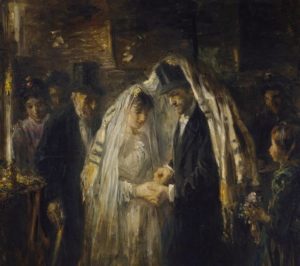In this week’s parasha, Ki Tetze, we find the verse that is traditionally used as the source for the mitzvah of marriage (Deuteronomy 24:1). One of the most famous and salient features of the Jewish wedding ceremony is the breaking of the glass. Where did this custom come from, and what does it mean?
The first and most common answer is that it is meant to symbolize the destruction of the Holy Temple in Jerusalem. As much as the wedding is an extremely joyous occasion, we must not forget that we are still in exile mode, and the world is far from where it needs to be. The verses recited by the groom before breaking the glass remind us of this: “If I forget you Jerusalem, let my right hand forget [its skill]. Let my tongue stick to the roof of my mouth if I remember you not; if I not set Jerusalem above my greatest joy.” (Psalms 137:5-6)
Exactly when this custom began is not clear. The earliest known reference to breaking a glass at a wedding does come from the Talmud (Berakhot 30b-31a), though for a different reason:

